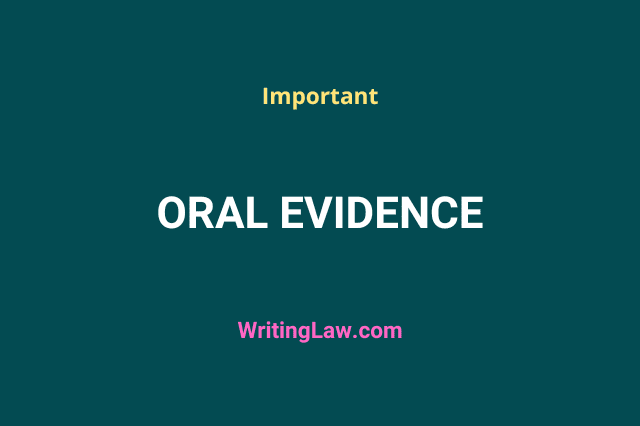
The existence of evidence strengthens the administration of justice. Anything that proves the subject matter to a court of law is considered evidence. A fact can be proved either by oral evidence or documentary evidence.
Oral evidence is when a fact is proved by presenting witnesses who can testify to it. Documentary evidence is used to prove a fact in an issue by producing a document that records the fact.
Here is an article that talks about the oral evidence in detail.
Meaning of Oral Evidence
Sections 59 and 60 of Chapter IV of the Indian Evidence Act provide for oral evidence. However, section 3 of the Evidence Act defines oral evidence. In the new Bharatiya Sakshya Adhiniyam, 2023, oral evidence is mentioned under Chapter IV.
Oral evidence, in general, refers to evidence provided orally by witnesses. A witness who cannot speak can still communicate the facts to the court via writing or gestures, and it’s considered oral evidence.
According to section 3 of the Evidence Act, oral evidence is any evidence that witnesses are allowed or required to provide orally in front of the court regarding the issue at hand.
In Queen-Empress vs Abdullah, a woman’s throat was cut, making her unable to speak. However, she gave the name of the attacker by using hand gestures, and this was considered to be oral evidence that was relevant to a dying declaration.
Rule With Regards to Oral Evidence
As section 60 of the Evidence Act provides, the oral evidence must be direct in all cases. This means that the witness can only present the facts of which he has firsthand knowledge.
Section 60 provides the four major principles for oral evidence. Until and unless they are proved, the evidence would not be admissible as oral evidence.
1. If the fact in issue could be seen, the evidence must be presented by such witnesses who have seen the crime or issue themselves. Illustration: A has seen B entering C’s house and coming out, committing theft. Here, no person other than A can give oral evidence.
2. If the fact in issue could be heard, the evidence must be presented by witnesses who have listened to it. Illustration: A has heard the sound of a quarrel in his neighbour B’s house, and in the evening, B’s wife C has been admitted to hospital with several injuries. Here, the evidence given by A will only be admissible as oral evidence.
3. If the fact in issue can be perceived in any other sense, the evidence can only be given by witnesses who have sensed it. Illustration: A finds the behaviour of B very odd around C, who is B’s friend, and later C is found dead. Only the evidence given by A will be admissible as oral evidence.
4. If the fact in issue depends on the opinion, it must be presented by witnesses who have that opinion. Illustration: If A thinks B is responsible for the theft committed in C’s house, only A’s personal opinion will be admissible as oral evidence.
Hearsay Evidence
Hearsay refers to information obtained or heard from another person. Hearsay evidence is not firsthand knowledge of a person concerning a matter or issue but what he hears about that particular matter from another person.
As hearsay is not directly obtained evidence, it is not considered admissible as oral evidence.
Exceptions to the Rule “Oral Evidence Must Be Direct”
Section 60 of the Evidence Act says that oral evidence must be direct. However, there are certain conditions under which the evidence, though hearsay, is admissible as oral evidence. These are:
- Res Gestae
- Admissions and confessions
- Dying declarations
- Evidence in the former proceedings
Res Gestae
As given by section 6 of the Evidence Act, if the statement of a person is a part of the same transaction, such statement can be proved by another person who appears as a witness. Here, even though it is hearsay evidence, which means indirect evidence, it is admissible as oral evidence. You can learn more about res gestae in our separate law note.
Admission and Confession
Any admission of liability or confession of guilt made outside of court can be proved by the evidence of the witness to whom it was made. Provisions related to admission and confession are given under sections 17 and 24-30 of the Indian Evidence Act, respectively.
Dying Declaration
According to section 32(1) of the Evidence Act, every information the deceased person passes on to another person is admissible if that person comes as a witness and testifies in court. You can learn more about it in this law note.
Evidence in the Former Proceedings
The evidence presented as a witness in a prior proceeding can be used as evidence in any subsequent proceeding involving the same parties because the witness has passed away or is otherwise unavailable.
- Understanding the Legislative Branch of the Indian Government - 6th May 2024
- Appointment, Oath, and Removal of Constitutional Posts in India - 28th April 2024
- Powers of Income Tax Authorities in India - 26th April 2024







